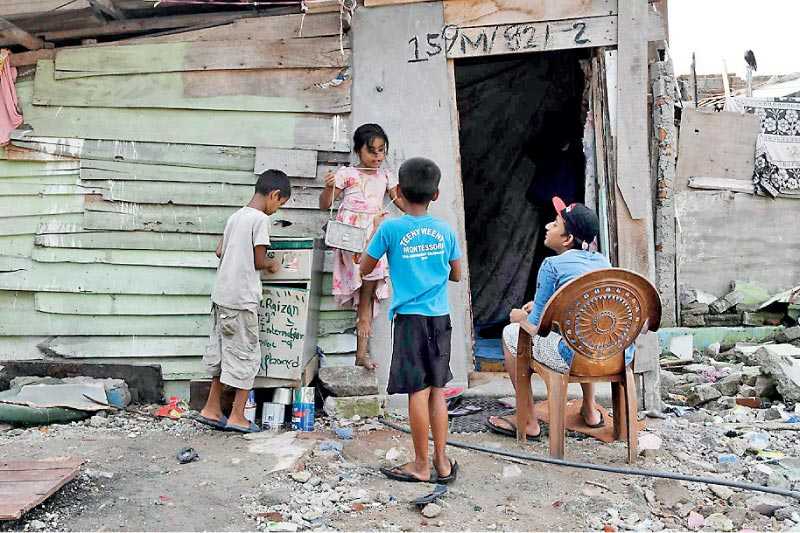Thursday Feb 26, 2026
Thursday Feb 26, 2026
Thursday, 4 February 2021 00:39 - - {{hitsCtrl.values.hits}}

In Sri Lanka, WFP together with the Ministry of Education helped supply take-home rations to approximately 78,000 schoolchildren as an alternative method of providing food security to children during this period – Pic by Shehan Gunasekara
Over 39 billion in-school meals have been missed globally since the start of the COVID-19 pandemic due to school closures, according to a new report released this week by the UNICEF Office of Research – Innocenti and the World Food Program (WFP).
‘COVID-19: Missing More Than a Classroom’ notes that 370 million children worldwide – many of whom are reliant on school meals as a key source of their daily nutrition – have missed 40% of in-school meals, on average, since COVID-19 restrictions shuttered classrooms.
“Despite clear evidence that schools are not primary drivers of COVID-19 infections, millions of children are facing school closures around the world,” said UNICEF Executive Director Henrietta Fore. “Children who depend on schools for their daily meals are not only losing out on an education but also on a reliable source of nutrition. As we respond to the COVID-19 pandemic and await vaccine distribution, we must prioritise the reopening of schools and take action to make them as safe as possible, including through renewed investments in proven infection prevention measures like clean water and soap in every school around the world.”
Latest estimates show that 24 million schoolchildren are at risk of dropping out of school due to the pandemic – reversing progress made in school enrolment in recent decades. School feeding programs can provide incentives for the most vulnerable children to return to school.“Missing out on nutritious school meals is jeopardising the futures of millions of the world’s poorest children. We risk losing a whole generation,” said WFP Executive Director David Beasley. “We must support governments to safely reopen schools and start feeding these children again. For many, the nutritious meal they get in school is the only food they will receive all day.”
During the pandemic, there has been a 30% overall reduction in the coverage of essential nutrition services including school feeding, micronutrient supplementation, and nutrition promotion programs in low- and middle-income countries, as well as programs for the treatment of severe malnutrition in children. During nationwide lockdowns in some countries, all school feeding programs were cancelled.
Global data on the overall impact of school closures on children’s nutrition is limited. However, country-level studies, previous knowledge of the impact of crises on food security and nutrition, and existing nutrition deficits among school-age children and adolescents are cause for significant concern, the report says.
In Sri Lanka, even before COVID-19 became a global pandemic, malnutrition has been a public health concern. According to the 2016 Demographic and Health Survey, wasting (acute malnutrition) affects 1 in 6 (15%) children below the age of five. Furthermore, one in ten (10%) of schoolchildren aged 6-12 years suffer from anaemia. Another study conducted by the Medical Research Institute, UNICEF, WFP and the Ministry of Health in 2017 shows that 40% of children aged 6-12 years were too thin (wasting) and 22% of adolescents aged 10-18 years were iron deficient, with girls displaying an iron deficiency rate three times higher than boys of the same age (National Nutrition and Micronutrient Study of School Adolescents in Sri Lanka – MRI, 2018).
With school closures enforced as a measure to curb the spread of the pandemic, nearly 1.1 million schoolchildren were unable to receive their daily meals in school. These free meals are a lifeline to many families, greatly helping to mitigate hunger and malnutrition.
School meals are not only vital in ensuring children’s nutrition, growth and development, they also provide a strong incentive for children – especially girls and those from the poorest and most marginalised communities – to return to school once restrictions are lifted. The longer children are out of school, the greater the risk that they will drop out of education altogether. Girls face the added risk of forced transactional sex or early marriage.
WFP has been supporting governments to adapt their school meals programs during school closures. In Sri Lanka, WFP together with the Ministry of Education helped supply take-home rations to approximately 78,000 schoolchildren as an alternative method of providing food security to children during this period. The take-home packs provided one month’s worth of rations to help families cope with the impacts of COVID-19 and safeguard children’s health and nutrition during school closures.
Since the start of the pandemic, UNICEF has supported national governments to maintain the continuity of nutrition services for school-age children and adolescents. In 2020, nearly 25 million school-age children and adolescents benefitted from programs for the prevention of anaemia. Tailored to context, most of these programs combined nutrition education and counselling, supplementation with iron and other essential micronutrients and deworming prophylaxis. In Sri Lanka UNICEF is supporting the Ministry of Education to develop guidelines and provide orientation for teachers to provide psychosocial support to children, as well as promote the emotional wellbeing of teachers themselves.
UNICEF and WFP are urging governments to prioritise schools for reopening while making sure that the health, food and nutritional needs of children are met through comprehensive, high-quality school feeding programs.